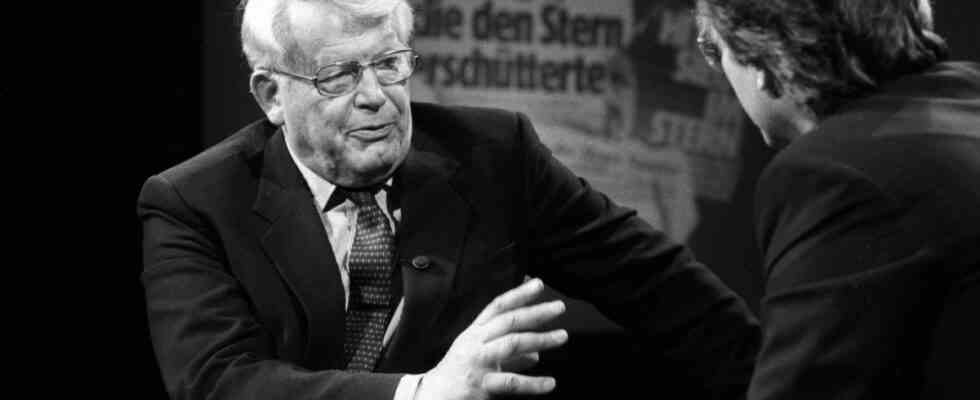He was immortalized in busts, on behalf of a prestigious journalism school and an award. But the venerability of the memory of the star-Founder and longtime editor-in-chief Henri Nannen, was recently questioned again. Bertelsmann, owner of RTL and the publishing house Gruner + Jahr, has now entrusted the Institute for Contemporary History (IfZ) in Munich with the independent processing of the history of the star commissioned – and in particular its founder. Bertelsmann announced that the research period will cover the years from the founding of the magazine by Nannen in 1948 until his departure in 1983. The focus is on dealing with the National Socialist legacy from the founding of the star by Henri Nannen, and “the question of political, personal and content-related interdependencies and connections at the time of National Socialism”.
The historian Magnus Brechtken, deputy director of the IfZ, heads the project. “It’s about the connections and interdependencies of Henri Nannen on the one hand, but also about other personalities who become relevant in the course of the research,” he explains when asked. In other words, the study not only deals with names, but of course with the more general question of who star shaped what these people did before 1945, and whether and how their Nazi past changed in the star put down.
Now the imagery of the “star” is scanned and evaluated
The imagery of the magazine in the 35 years from 1948 onwards is to be examined, and the question of how “topoi, clichés, characterizations, perspectives, which were already used in National Socialism to represent people and cultures in images and texts, also after 1945 reappear”. Or to what extent there are continuations, modifications or completely new forms of representation. For this purpose, the holdings of the Bavarian State Library will also be used, where the gigantic photo archive of the star located. Brechtken calls it an “outstanding source on post-war German history” that has so far received little attention. For example, it will be analyzed how photographers who worked for publications of the NS regime after 1945 for the star and how their choice of topics and their visual language developed in the process.
It’s about “continuities and discontinuities, about the development of worldviews, as they appear in both texts and photo reports,” says Brechtken. Of the star stands at the center of the project, but based on his example one hopes to expand the understanding of the influence of National Socialism in German post-war journalism. Another goal, as Bertelsmann put it in its statement, is “to create a factual basis for public debate.”
The Institute for Contemporary History (IfZ) in Munich: The historians there are supposed to work up the history of the “Stern” and its founder.
(Photo: Catherine Hess)
The recently resurrected debate about Nannen, his Nazi past and his star started with that in May CTRL_Fa reportage format of the NDR, published a contribution in which again the Nannen’s well-known activity through biographies and eyewitness accounts as a propagandist during the war. Among other things, the contribution showed pictures of the anti-Semitic leaflets, should have been responsible for the Nannen. The new Star-Editor-in-chief Gregor Peter Schmitz then declared that one would “have to look at the (complicated) man Nannen even more critically than before”, and in star “struggling openly to the question” how to evaluate Nannen. The Nannen Prize for journalists was then awarded as the “Stern Prize” in June.
Henri Nannens Son Christian and his grandchildren Stephanie and Jan-Oliver Nannen had criticized and demanded the reporting of the NDR with media lawyer Christian Schertz, to provide parts of the research with editorial notes, to take others offline. The NDR rejected this, but agreed to talks and to change the title of a contribution.
The Kunsthalle Emden, whose co-founder is Eske Nannen, Henri Nannen’s widow, also announced in May that they wanted to commission an external historian to “present Nannen’s life story comprehensively and thus classify the work and work of Henri Nannen enable”. The director of the Kunsthalle, Michael Kühn, has now informed the SZ that this commission has not yet been given by the Henri and Eske Nannen Foundation and the Otto van de Loo donation. “The selection process and the consultations with independent experts are still ongoing.” However, any research project that deals with Nannen, his life and work and his time is welcomed. “The potential for synergy effects should also be explored and the possibility of coordination and cooperation should be examined.”
The research project at the Institute for Contemporary History in Munich is designed to last several years. According to Bertelsmann, a scientific conference is also being considered. Thomas Rabe, CEO of the media group, explained: “By analyzing the star-History we want to make a contribution to the media history of the young Federal Republic possible”, the IfZ will be supported in its work unreservedly.

